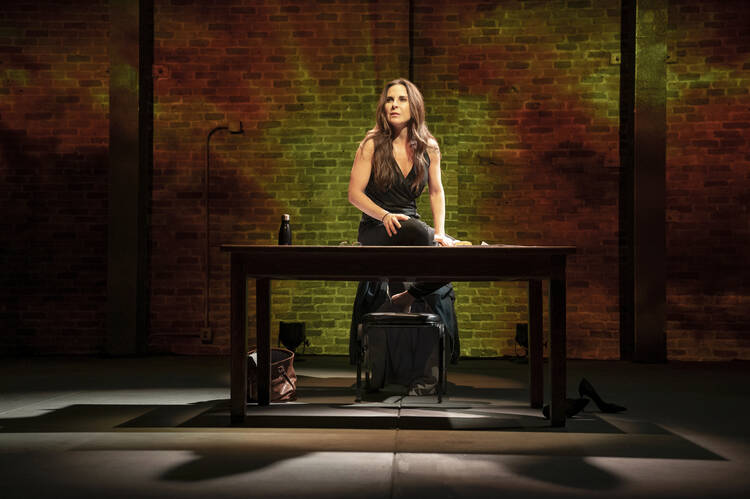Growing up gay in a fundamentalist Catholic family between El Paso and Ciudad Juárez, Mexico, the playwright Isaac Gomez found solace in biblical stories involving women. He loved Mary Magdalene, Rebecca, “all the Sarah’s” and, of course, the Virgin Mary. They were figures of endless love and compassion who provided him with strength as he wondered how he would fit into a religion that had no place for someone like him.
However, Gomez noticed that eventually most of the women disappeared from scripture. Following the crucifixion, there is nary a mention of the Virgin Mary (she is casually mentioned in Acts, where Luke lists her among the people who convened to pray together after the Ascension), which led him to wonder, “What happened to her next?”
As an adult, Gomez has become one of the rising stars of American theater, having his plays staged in Chicago and New York City, where the Audible Theater production of “the way she spoke” runs at the Minetta Lane Theatre through Aug. 18. In the play, Gomez creates a docu-mythologia around the disappearance and murders of more than 700 women in Ciudad Juárez since 1993, leading him to ask the same questions he had about his biblical heroines: Where did they go?
While Mexican authorities have failed to bring the femicide to an end, artists, activists and family members of the missing women demand that justice is made. In hopes of finding answers, or at least a way to contribute, Gomez wrote sister plays “La Ruta” and “the way she spoke,” both of which center on the lives of people in Juárez.
In the meta-theatrical “spoke,” the Mexican superstar Kate del Castillo plays “the Actress,” an unnamed thespian reading the script of a play about the women of Juárez. Known for her vibrant work in telenovelas and film (think the spitfire confidence of a young Katharine Hepburn), the play presented del Castillo with a challenge: her first stage monologue in English.
Gomez wrote sister plays “La Ruta” and “the way she spoke,” both of which center on the lives of people in Juárez.
As the Actress discovers what develops on page after page, del Castillo becomes different characters without relying on props, costume changes or hairdos. “We didn’t want to create caricatures,” she explains to me, “we’re there to deliver a message, not to show off.”
All of the characters are based on real life people Gomez interviewed in preparation for the play. A father who is offered a new television set to stop questioning what happened to his daughter; a young woman who serves as a guide in the tumultuous city; and plenty of mothers still waiting for their daughters to come home. One of them, Yolanda, struck Gomez for one peculiarity in her household: the lack of images of the Virgen de Guadalupe.
The patron saint of Mexico, and perhaps the most famous of all the “vírgenes mestizas,” Our Lady of Guadalupe is a staple in Mexican Catholic homes. Her presence is so expected that Gomez describes Yolanda’s home as giving him “cultural shock.” It also inspired the most powerful moment in a play that exists in a state of emotional crescendo.
The patron saint of Mexico, and perhaps the most famous of all the “vírgenes mestizas,” Our Lady of Guadalupe is a staple in Mexican Catholic homes.
Transforming her face from that of a man pleading to the heavens into a more solemn gesture, del Castillo looks at the audience with kind eyes: “Can you hear them?” she asks. She is playing the Virgen de Guadalupe, who then goes into a heart wrenching monologue about how she listens to everyone, but can only help a few. “And it kills me,” she says.
Although her image can be found on everything from postcards to cell phone cases, the Virgen de Guadalupe has rarely been voiced in fiction. Films that date from the silent era to popular television series like “La rosa de Guadalupe” depict her discovery by Juan Diego in 1531 or portray her as a holy apparition meant to comfort characters in desolation. But she rarely speaks.
The Virgen de Guadalupe has rarely been voiced in fiction.
Church guidebooks from the 18th century specify the way Our Lady should be represented in paintings and books, but other than the “tragic Bible reenactments on Mexican religious channels,” Gomez couldn’t think of another instance when she was voiced with such a strong point of view, as the Virgen in his play.
Gomez remembers del Castillo’s reaction upon reading the scene for the first time: “Oh my God, it’s la Virgen,” she exclaimed, worried the portrayal might seem blasphemous. The playwright explained it was his version of her, which according to him, led the relieved actress to comment, “Great, it’s not me, it’s Isaac, I’m absolved.”
After years of doubting his faith, Gomez was surprised to realize the hold the Virgen had on him. Lilian, one of the women from Juárez explained to him that the Virgen “isn’t significant to las mujeres de Juárez. She’s significant to las madres de Juárez. She listens. Because she is a mother who has lost, too.” Before going onstage each night, del Castillo visits an altar she set up in the Minetta Lane Theatre where she thanks the women of Juárez for allowing her to tell their story. “Although the Virgen doesn’t show up, you know someone is listening to you, giving you solace when you feel bad,” explains the actress. “That’s why people keep praying and having faith. They know someday something will happen.”
The power of “the way she spoke,” lies in how it is theatre as activism, theater as history chronicle, but most surprisingly theatre as prayer. The hope someone will listen keeps Gomez, del Castillo and the women of Juárez in constant vigil.
“The way she spoke” runs at the Minetta Lane Theatre through Aug. 18. The audiobook of the play will be released by Audible on Oct. 4.









